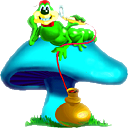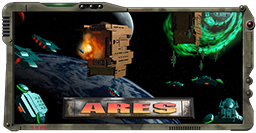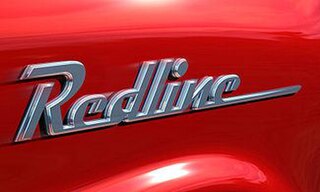
Escape Velocity is a single-player role-playing space trading and combat video game series first introduced in 1996 by Ambrosia Software for the Macintosh. Two other similar games based on the original, EV Override and Escape Velocity Nova, followed in 1998 and 2002 respectively, the latter of which is also available on Microsoft Windows. In addition there is a trading card game available based on the storyline of the EV Nova universe.
Escape Velocity Nova is a video game developed by Ambrosia Software in collaboration with ATMOS. It is the third game in the Escape Velocity series of space trading and combat games. It was released on March 19, 2002 for Mac OS X and Mac OS 9, and later ported to Windows and released on July 11, 2003. The game's premise, set in a time period after mankind has discovered hyperspace technology, grants the player freedom to take missions, trade goods, steal from other ships, and enter one of six storylines.

Llamatron is a multidirectional shooter video game programmed by Jeff Minter of Llamasoft and released in 1991 for the Atari ST and Amiga and in 1992 for MS-DOS. Based on Robotron: 2084, players of Llamatron control the eponymous creature in an attempt to stop an alien invasion of Earth and rescue animals—referred to as "Beasties"—for points. Players advance by destroying all of the enemies on each level using a laser that fires automatically in the direction that the Llamatron is moving. Various power-ups exist to aid the player in defeating the wide variety of enemies and obstacles they face along the way.
Stunt Copter is a monochrome Macintosh action game written by Duane Blehm and published by his Kansas-based company, HomeTown Software, in 1986.

Rogue Amoeba Software, Inc. is a software company that produces audio software, specializing in applications for audio capture for the Macintosh platform. Rogue Amoeba's best-known products are Audio Hijack and Audio Hijack Pro. The Audio Hijack programs allow for users to capture and record audio from any program running under macOS. The Pro version adds support for VST, Audio Unit, and LADSPA plugins, among other features.

Maelstrom is a multidirectional shooter developed by Andrew Welch and released as shareware in November 1992 for Mac OS. The game is an enhanced clone of Atari, Inc.'s 1979 Asteroids arcade video game with a visual style similar to the Atari Games 1987 sequel, Blasteroids. Maelstrom was released when there were few action games for the high-resolution color displays of the Macintosh, and the game attracted attention despite the dated concept. The response led Welch to start Ambrosia Software.

Mars Rising is a vertically scrolling shooter written by David Wareing and released as shareware by Ambrosia Software for Macintosh computers in 1998. Reviewers called out similarities to Xevious and Raiden. It was followed by Deimos Rising in 2001.

Apeiron is a Macintosh game developed and released as shareware by Ambrosia Software. An adaptation of the 1980 arcade game Centipede, it was first released on February 11, 1995. In November 2004, a Mac OS X port was made available.

Casady & Greene was a software publisher and developer active from 1988 to 2003. The company primarily released software for Macintosh, but also released software for Windows and Newton. Casady & Greene was formed in 1988 when Greene, Inc. acquired CasadyWare, a company owned by Robin Casady.

Unsanity was a macOS shareware software developer founded in May 2000, notable for coining the term "haxie". Unsanity produced Mac utilities that relied on their own Application Enhancer, a utility that modified the system and other applications. Software incompatibility with Mac OS X Leopard, Snow Leopard, and Lion ended Unsanity's offerings.

Ares is a space strategy video game created by Nathan Lamont of Bigger Planet Software, and first released by Changeling Software in 1998. In 1999 the game was re-released as shareware by Ambrosia Software and released as open source software and freeware in 2008. The key feature of the game was its ability to zoom in and out smoothly; this allowed the player to switch between a close-up view, which emphasized space combat skills, and a strategic view of the entire map.

Redline is a video game for Mac OS X developed by Jonas Echterhoff and published by Ambrosia Software. The game's primary features are its ability to simulate actual racing physics, online play, and support for the addition of third party content via plug-ins. The combination of these features have attracted numerous players and led to the creation of a seasonal racing league. Redline also has several modes of gameplay for those who prefer arcade style physics commonly found in other racing games. The game is now currently obsolete and an error message will be displayed upon opening the application as of OS X Snow Leopard and above. However, a fan-made patch allows the game to run on OS X Mavericks and above, but in single-player modes only.
Amiga software is computer software engineered to run on the Amiga personal computer. Amiga software covers many applications, including productivity, digital art, games, commercial, freeware and hobbyist products. The market was active in the late 1980s and early 1990s but then dwindled. Most Amiga products were originally created directly for the Amiga computer, and were not ported from other platforms.

GooBall is a 2005 arcade-style puzzle video game developed by Over The Edge Entertainment for Mac OS X and published by Ambrosia Software. It is Over The Edge's first game, and runs on an early beta version of the Unity engine, which it was meant to showcase. Though it was highly downloaded, the game was commercially unsuccessful, leading Over The Edge to change its focus from making games, to making the Unity engine.

Pillars of Garendall is a role-playing video game that was built by Beenox Studios and Ambrosia Software. It was built using the Coldstone game engine, which was also a joint Beenox/Ambrosia project. The game was released in 2001 for Mac OS Classic, Microsoft Windows and Mac OS X.
SketchFighter 4000 Alpha is a 2006 Metroidvania scrolling shooter video game developed by Lost Minds and originally published by Ambrosia Software for Mac OS X. SketchFighter uses OpenGL and a custom game engine to create visuals for all elements of the game reminiscent of hand-drawn sketches.

Oids is a multidirectional shooter developed and self-published by FTL Games in 1987. The game was originally released on the Atari ST, followed by a B&W version for the classic 68k Macintosh in 1990. The Atari ST version, written by Dan Hewitt, was a cult favourite in the UK, where it received rave reviews.

Carbon Copy Cloner is a backup and disk cloning utility for macOS made by Bombich.













